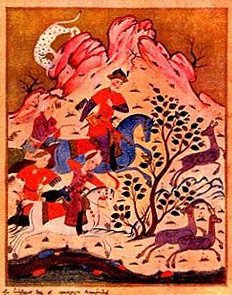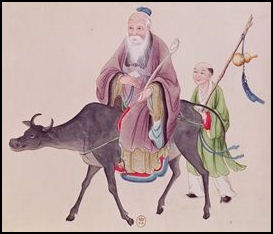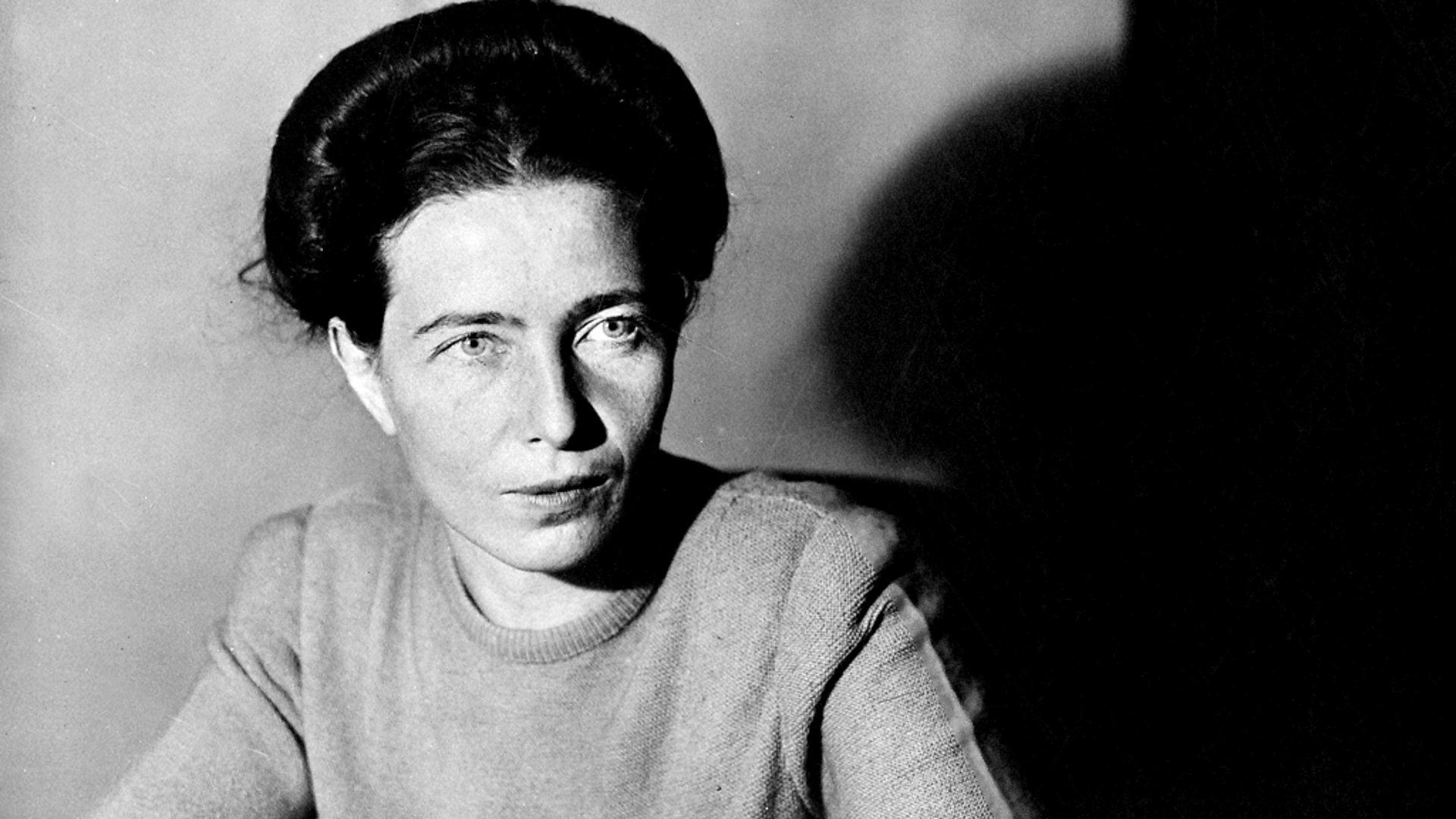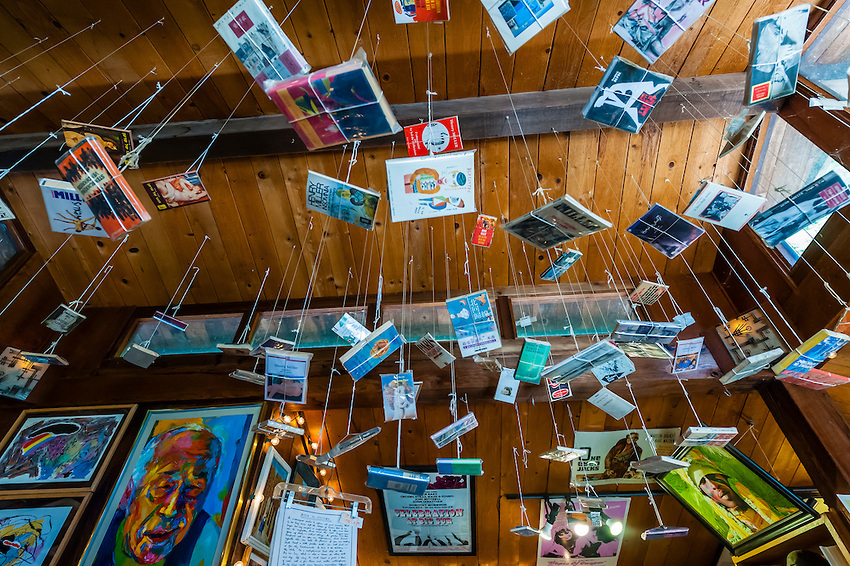(Feature Image: Henry Miller Memorial Library)
In response to The New York Times article “650 Prompts for Narrative and Personal Writing.”
323. “What Are the Best Books You’ve Read This Year?”
Anna Karenina by Leo Tolstoy

(art by Tzviatko Kinchev)
Reading this novel, for Professor James Lasdun’s “Form and Style” seminar, is changing my life. I entered the book hoping to learn a little bit about how T develops an epic story, so I could begin applying it to my own writing; there are stream of consciousness passages within masterful third-person narration, scenes in the countryside and in the city, and two opposite possibilities for human love. Love, “I think,”–as Anna says–is the novel’s driving yet uncontrollable force, as well as its main theme. I’m only in Part III and already I’ve come across answers to questions that I’ve had for many years. Here are some one liners from its principle characters:
“‘Well of course,’ Stepan Arkadyich picked up. ‘But that’s the aim of civilization: to make everything an enjoyment.'”
“…[Kitty] understood that you had only to forget yourself and love others and you would be calm, happy, and beautiful.”
“‘I think,’ said Anna, toying with the glove she had taken off, ‘I think…if there are as many minds as there are men, then there are as many kinds of love as there are hearts.'”
“The longer Levin mowed, the more often he felt those moments of oblivion during which it was no longer his arms that swung the scythe, but the scythe itself that lent motion to his whole body, full of life and conscious of itself, and, as if by magic, without a thought of it, the work got rightly and neatly done on its own. These were the most blissful moments.”
The last one, from my homeboy Levin–whom I identify with on an atomic level–speaks to my ideal form of work, writing, and living life. I can’t wait to finish this novel, so that I can reread it.
Meditations by Marcus Aurelius

Few times are we able to put our “flesh, breath, and reason” directly onto the page. Aurelius, 2nd century philosopher-king, managed to at the end of his life. His Meditation is, “in the parlance of our times,” a testament to being real. Among the many passages that I’ve underlined, and which echo in me, here is one I’ve underlined twice:
Book VIII, 5. “The first rule is, to keep an untroubled spirit; for all things must bow to Nature’s law, and soon enough you must vanish into nothingness, like Hadrian and Augustus. The second is to look things in the face and know them for what they are, remembering that it is your duty to be a good man. Do without flinching what man’s nature demands; say what seems to you most just — though with courtesy, modesty, and sincerity.”
Stare at what scares you. Stare at the white page. Stare at him, her. And pay attention to what unfolds.
The Man In the Panther Skin by Shota Rustaveli

A Georgian epic poem — their Beowulf. It taught me many things, not just about medieval romance, but about the capacity for human emotion, especially when utterly out in the open.
246. “I am a lover, a madman to whom life is unbearable.”
I have dropped this one, since reading it, more than once.
Tao Te King by Lao Tse

Where is the line between poetry and philosophy? Between growing as a person and returning to your core? Between following your dreams and desiring nothing? The stanzas in this old book could be etched in the sand and still be read after a tide washed it away — they’re so timeless — because the message would be the same. All of life, nature that is, is telling us something. Willing to listen is easy, if only we were able.
“Cuando el hombre es niño es tierno y
Blando
Pero cuando llega la muerte se vuelve
Rígido y duro
Hierbas y arboles cuando brotan son
Tiernos y débiles
Pero cuando les llega la muerte se vuelven
Mustios y secos
Por esto lo rígido y lo duro son heraldos
De la muerte
Peo esto lo tierno y lo débil son heraldos
De la vida
Así cuando un ejército es fuerte perderá
Las batallas
Así cuando un árbol esta rígido será hecho
Leña
El sitio de lo fuerte y lo duro está debajo
El sitio de lo débil y lo tierno está en lo alto”
Ulysses by James Joyce

You can be a classic, and still be goofy; aside from the mind grenades, that’s the lesson this book taught me:
“Haines sat down to pour out the tea.
–I’m giving you two lumps each, he said. But, I say, Mulligan, you do make strong tea, don’t you?
Buck Mulligan, hewing thick slices from the loaf, said in an old woman’s wheedling voice:
–When I makes tea I makes tea, as old mother Grogan said. And when I makes water I makes water.
–By Jove, it is tea, Haines said.”
Whenever I pour water into a pot, and don’t feel stingy, I’ll add an extra bag of tea and recite Joyce’s poetry.
The Artist’s Way by Julia Cameron

What this book did for me is immeasurable. It has cut out the tongue of my troubled mind, and given it to my inner artist.
“As we become aware of out blocking devices — food, busy-ness, alcohol, sex, other drugs — we can feel our U-turns as we make them. The blocks will no longer work effectively. Over time, we will try — perhaps slowly at first and erratically — to ride our the anxiety and see where we emerge. Anxiety is fuel. We can use it to write with, paint with, work with.”
I don’t live with limits anymore, only moments of passable road blocks. Thank you, Mrs Cameron, for showing me the way. I am an artist. I am.
The Odyssey (they say) by Homer

A book for the young man or woman about to embark on a journey, in need of a mentor, in need of the white dove with a reassuring voice.
“‘Telemachus,
the bright-eyed goddess Athena reassured him,
‘some of the words you’ll find within yourself,
the rest some power will inspire you to say.
You least of all — I know —
were born and reared without the gods’ good will.'”
In us are the gods, perhaps, and so endure we can, and continue we must.
The Second Sex by Simone De Beauvoir

There is much to learn from, people to listen to, and ideas to share in the realm of feminism, in our efforts for equality. This last line from the book still resonates with me.
“The case could not be better stated. It is for man to establish the reign of liberty in the midst of the world of the given. To gain the supreme victory, it is necessary, for one thing, that by and through their natural differentiation men and women unequivocally affirm their brotherhood.”
I hope it resonates with you.




